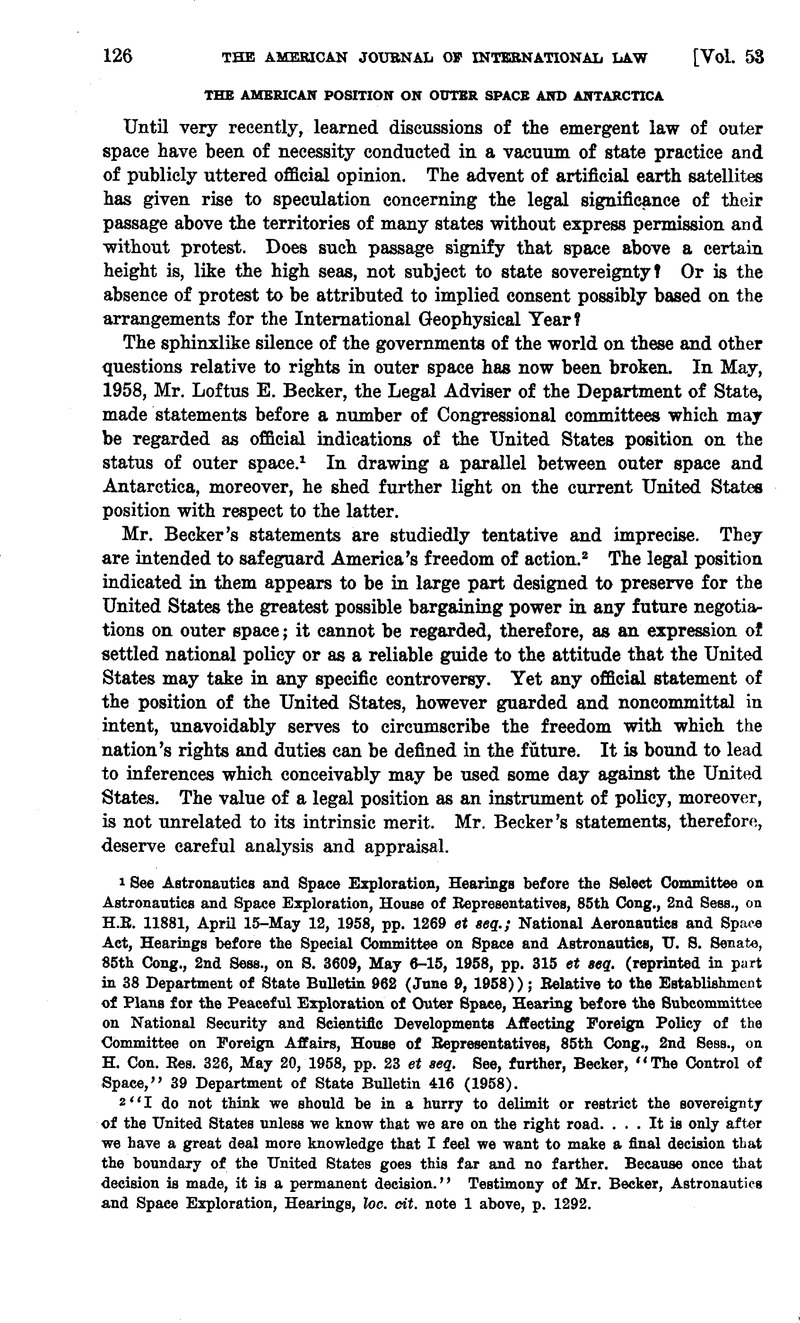Published online by Cambridge University Press: 28 March 2017

1 See Astronautics and Space Exploration, Hearings before the Select Committee on Astronautics and Space Exploration, House of Representatives, 85th Cong., 2nd Sees., on H.E. 11881, April 15-May 12, 1958, pp. 1269 et seq.; National Aeronautics and Space Act, Hearings before the Special Committee on Space and Astronautics, TJ. S. Senate, 85th Cong., 2nd Sess., on S. 3609, May 6-15, 1958, pp. 315 et seq. (reprinted in part in 38 Department of State Bulletin 962 (June 9, 1958)); Belative to the Establishment of Plans for the Peaceful Exploration of Outer Space, Hearing before the Subcommittee on National Security and Scientific Developments Affecting Foreign Policy of the Committee on Foreign Affairs, House of Representatives, 85th Cong., 2nd Sess., on H. Con. Res. 326, May 20, 1958, pp. 23 et seq. See, further, Becker, “The Control of Space,” 39 Department of State Bulletin 416 (1958).
2 ” I do not think we should be in a hurry to delimit or restrict the sovereignty of the United States unless we know that we are on the right road… . It is only after we have a great deal more knowledge that I feel we want to make a final decision that the boundary of the United States goes this far and no farther. Because once that decision is made, it is a permanent decision.” Testimony of Mr. Becker, Astronautics and Space Exploration, Hearings, loc. cit. note 1 above, p. 1292.
3 Except as otherwise indicated, this summary is based on the prepared statement read by Mr. Becker on May 14, 1958, before the Special Committee on Space and Astronautics, U. S. Senate, National Aeronautics and Space Act, Hearings, loc. cit. note 1 above, reprinted in 38 Department of State Bulletin 962 (1958).
4 In reply to questions, Mr. Becker added: “ I may say that aside from this rather extreme 10,000 miles, there was an article the other day indicating that some responsible scientist said that there were indications of atmosphere up to 40,000 or even 200,000 miles from the surface of the earth… . I would say 10,000 miles could well be taken as an outside limit, although we have never taken any exact position on the point.'' National Aeronautics and Space Act, Hearings, loc. cit. note 1 above, pp. 333-334.
5 Astronautics and Space Exploration, Hearings, loo. cit. note 1 above, pp. 1273-1274, 1316; National Aeronautics and Space Act, Hearings, loo. cit. note 1 above, p. 334.
6 Astronautics and Space Exploration, Hearings, loc. cit. note 1 above, pp. 1275, 1303, 1316-1317. He further expressed the opinion that the state sending such vehicles would be “ a guarantor with respect to any damage resulting from its unjustified activity.“ Ibid.
7 In October, 1958, however, a rocket fired by the United States reached an altitude of some 79,000 miles.
8 Since the United States and the Soviet Union are the only states that have so far engaged in activities in what may be regarded as “outer space,” Mr. Becker's remarks may conceivably be interpreted as suggesting that the universe beyond the earth's atmosphere be divided between these two Powers. This interpretation finds some support in other parts of Mr. Becker's testimony: “Let me say two nations have a capability of getting to outer space, and it was now agreed that outer space would be devoted exclusively to peaceful purposes, and they asserted the right to police outer space to see that it was preserved for peaceful purposes. Under those circumstances I can see some benefit in those two nations preventing another nation from going into outer space in order to put a military object into outer space.” Eelative to the Estab lishment of Plans for the Peaceful Exploration of Outer Space, Hearing, loc. cit. note I above, p. 30. Mr. Becker, it may be noted, apparently did not concede that the United States would be bound by a decision of a majority of the nations of the world or of the United Nations. Astronautics and Space Exploration, Hearings, loc. cit. note 1 above, pp. 1287, 1309; but cf. ibid., p. 1282.
9 See, e.g., Hayton, , “The ‘American’ Antarctic,” 50 A.J.I.L. 583 (1956),Google Scholar and sources there cited.
10 See, e.g., 1 Hackworth, Digest of International Law 393-401.
11 See, in this connection, Toma, , “Soviet Attitude Towards the Acquisition of Territorial Sovereignty in the Antarctic,” 50 A.J.I.L. 611 (1956)Google Scholar